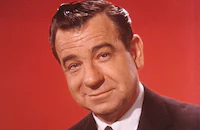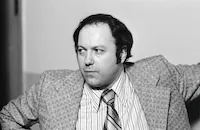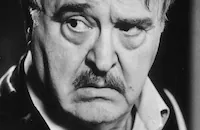Billy Wilder had the most deliciously dirty mind in Hollywood. The director dug into racy, controversial subjects with cynical wit and rare candor; he set new standards for film noir, sex comedies and the buddy film and his movies continue to inspire new generations of filmmakers.
Cameron Crowe, screenwriter and director of contemporary hit films such as Jerry Maguire(1996), was one of those moved by Wilder's film sense. The struggling filmmaker struck up a friendship with the 93-year old veteran and found a friend and a mentor. Their conversations were recently chronicled in a book by Cameron Crowe entitled Conversations with Wilder(published by Knoft).
Billy Wilder might have been born in Vienna, but American culture influenced him from the earliest days. Given the name Samuel, Wilder's mother called her son 'Billy' in honor of Buffalo Bill Cody. The name stuck.
Billy was as restless as his namesake and left law school to become a journalist. While grinding out articles for a Berlin newspaper, Wilder joined with future film directors Fred Zinnemann, Robert Sidomak and Edgar G. Ulmer to make a short film, Menschen Am Sonntag (1929). By the mid-1930s, he had written seven scenarios and even tried his hand at directing. After Hitler's rise to power in 1934, Wilder fled his homeland. Once in Hollywood, Wilder and roommate Peter Lorre had to learn English quickly if they wanted to join the American film industry. Together the German expatriates learned the language and began staking their territory in the Dream Factory.
As a writer, Wilder could craft realistic relationships with sharp dialogue; he proved this in his scripts for Ninotchka (1939) with Greta Garbo and Howard Hawks' Ball of Fire(1941). As a filmmaker, Wilder was well acquainted with the shadowy, brooding style of German Expressionism. He brought these two gifts together to create a landmark film noir - DOUBLE INDEMNITY(1944). He followed this cinematic triumph with a risky project, the story of an alcoholic on a three-day binge. Not the usual subject matter for a Hollywood studio, THE LOST WEEKEND (1945) nevertheless claimed the Academy Award for Best Picture. By the end of the decade, Wilder dared even to paint a portrait of Hollywood stardom gone awry in Sunset Boulevard (1950).
Each of these films is an undisputed classic today, but even at the time, his films were lauded. Six of his screenplays were nominated for Oscars between 1941-1950. Three of his eight Best Director nominations also came during this period. Billy Wilder claimed the American Dream; he was successfully playing by his own rules.
By the end of the '50s, as censorship guidelines were easing, Wilder's projects became even more daring. Sex was central to Wilder's world and Hollywood celebrated his candor. He directed Marilyn Monroe in two of her most sensuous roles, The Seven Year Itch (1955) and SOME LIKE IT HOT(1959). More often than not, Wilder liked pointing his finger at the hyprocrisy of people's sexual mores. In THE APARTMENT(1960), Wilder took an incisive look at corrupt businessmen exploiting their employees for sexual favors. In IRMA LA DOUCE (1963), the world of a Parisian prostitute was lovingly painted in Technicolor tones. In Kiss Me, Stupid (1964), Wilder finally stepped over the line with the story of a struggling composer willing to offer his wife to sell a song.The film, which seems so innocent today, was scandalous in its own day. Critics called Kiss Me, Stupid pornographic smut and buried the picture. Audiences ignored it. Today, the film is a risque farce with great performances by Dean Martin and Kim Novak. The critical lambast deeply affected Wilder; this would be his last sex comedy.
In 1966 Wilder brought together the dynamic combination of Jack Lemmon and Walter Matthau with THE FORTUNE COOKIE. Director and stars teamed again for The Front Page (1974), a remake of the newspaper classic; and Buddy, Buddy (1981), the story of an assassin and a sad sack ready to commit suicide.
Wilder's many years in Hollywood produced an amazing string of hits. From sarcastic and cynical social commentary to outrageous sex farce, Wilder pushed his audiences to look at their own values and morals. He was an outsider who wasn't afraid to point out the follies of his fellow man or the worst aspects of American culture. He will be sorely missed.
By Jeremy Geltzer
The Front Page

Brief Synopsis
Cast & Crew
Billy Wilder
Jack Lemmon
Walter Matthau
Carol Burnett
Susan Sarandon
Biff Elliot
Film Details
Technical Specs
Synopsis
The ruthless managing editor of a Chicago newspaper angrily learns his ace reporter plans to leave the paper to get married. While he trains a replacement, all hell breaks loose and a convicted killer escapes from right under the nose of a bumbling sheriff.
Cast

Jack Lemmon

Walter Matthau

Carol Burnett

Susan Sarandon
Biff Elliot
Herbert Edelman
Lou Frizzell
Jon Korkes
John Furlong

Cliff Osmond
Joshua Shelley

Martin Gabel

Allen Jenkins
Harold Gould
Barbara Davis

Allen Garfield
Dick O'neill
Noam Pitlik

Vincent Gardenia

David Wayne

Austin Pendleton
Doro Merande
Paul Benedict
Leonard Breman

Charles Durning
Crew
Henry Bumstead
Jordan Cronenweth
I. A. L. Diamond
Jed Harris
Ben Hecht
George S. Kaufman
Howard Kazanjian
Jennings Lang
Charles Macarthur
Robert Martin
Billy May
David Menteer
Burton Miller
Paul Monash
James W. Payne
Billy Wilder
Ralph E. Winters
Film Details
Technical Specs
Articles
TCM Remembers - Billy Wilder

TCM Remembers - Billy Wilder
Quotes
Trivia
Miscellaneous Notes
Released in United States on Video April 23, 1992
Released in United States Winter December 1974
Re-released in United States on Video March 14, 1995
Remake of "The Front Page" (USA/1931) directed by Lewis Milestone.
Photographer Tony Gaudio was replaced by Hal Mohr, who was subsequently replaced by Glen McWilliams. None of Gaudio's work was used in the finished film. Herman J. Mankiewicz has a bit part in the film.
Re-released in United States on Video March 14, 1995
Released in United States on Video April 23, 1992
Released in United States Winter December 1974















